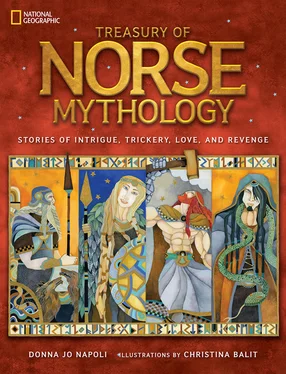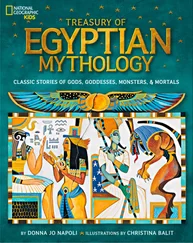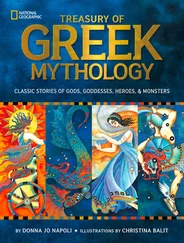Christina Balit - Treasury of Norse Mythology - Stories of Intrigue, Trickery, Love, and Revenge
Здесь есть возможность читать онлайн «Christina Balit - Treasury of Norse Mythology - Stories of Intrigue, Trickery, Love, and Revenge» — ознакомительный отрывок электронной книги совершенно бесплатно, а после прочтения отрывка купить полную версию. В некоторых случаях можно слушать аудио, скачать через торрент в формате fb2 и присутствует краткое содержание. Жанр: unrecognised, на английском языке. Описание произведения, (предисловие) а так же отзывы посетителей доступны на портале библиотеки ЛибКат.
- Название:Treasury of Norse Mythology: Stories of Intrigue, Trickery, Love, and Revenge
- Автор:
- Жанр:
- Год:неизвестен
- ISBN:нет данных
- Рейтинг книги:4 / 5. Голосов: 1
-
Избранное:Добавить в избранное
- Отзывы:
-
Ваша оценка:
- 80
- 1
- 2
- 3
- 4
- 5
Treasury of Norse Mythology: Stories of Intrigue, Trickery, Love, and Revenge: краткое содержание, описание и аннотация
Предлагаем к чтению аннотацию, описание, краткое содержание или предисловие (зависит от того, что написал сам автор книги «Treasury of Norse Mythology: Stories of Intrigue, Trickery, Love, and Revenge»). Если вы не нашли необходимую информацию о книге — напишите в комментариях, мы постараемся отыскать её.
Treasury of Norse Mythology: Stories of Intrigue, Trickery, Love, and Revenge — читать онлайн ознакомительный отрывок
Ниже представлен текст книги, разбитый по страницам. Система сохранения места последней прочитанной страницы, позволяет с удобством читать онлайн бесплатно книгу «Treasury of Norse Mythology: Stories of Intrigue, Trickery, Love, and Revenge», без необходимости каждый раз заново искать на чём Вы остановились. Поставьте закладку, и сможете в любой момент перейти на страницу, на которой закончили чтение.
Интервал:
Закладка:
Why they cut off poor Mimir’s head because of closed-mouthed Hoenir is unfathomable. Gods had their own ways of doing things.
Odin was bereft, for Mimir had been a fine and true friend. He held that severed head in his arms and crooned to it. Then he coated it with herbs that would retard decay and sang magic incantations over it. The head of Mimir regained its power of speech and thenceforth became a font of wisdom for Odin.
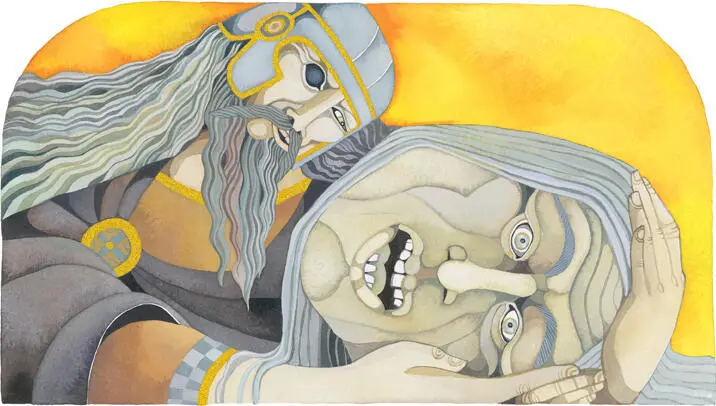
The Aesir sent the wise giant Mimir to their rival gods, the Vanir, in an exchange. But the Vanir got angry and cut off poor Mimir’s head. Odin grieved for his lost friend.
And thus the first war in the cosmos began and ended. But it wasn’t the last. Humans waged war often. And the gods treated the corpses of men who died in battle very well. They didn’t go to Hel. No, no. Half of them went to Asgard to live in a special hall called Valhalla, where spear shafts served as rafters and the roof was thatched with shields. At the western door lurked a wolf with an eagle hovering overhead. To arrive in Valhalla, the fallen warriors had to cross a large, noisy river. Once there, Odin welcomed them heartily. He had straw strewn on the benches in the hall to make them comfortable; he had all the goblets polished, for he already foresaw needing these warriors. Someday, he knew, there would be a final great battle among gods, humans, monsters, giants, everyone—the all-consuming Ragnarok. Warriors would be invaluable.
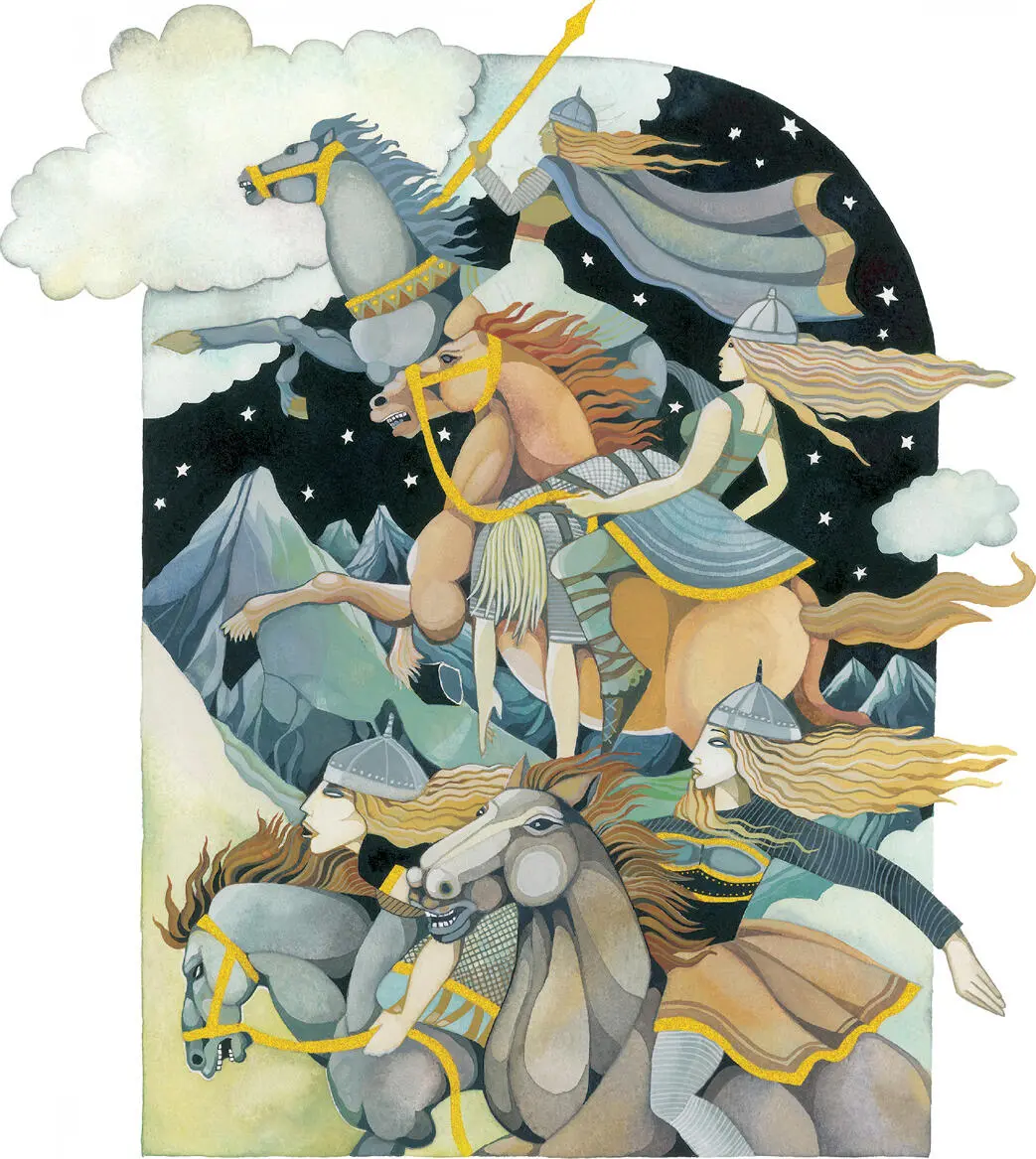
The Valkyries flew on their horses over battlefields and chose the best fallen warriors to bring back to Valhalla. The warriors feasted and practiced their martial arts there, preparing for the great battle of Ragnarok that would come someday.
Odin’s helper maids, the Valkyries, put on silver helmets from which their golden hair flowed out and red corselet armor that emphasized their beautiful bodies, and they rode on white horses through the air over the battlefields below. They must have appeared both terrifying and alluring to the sweaty, exhausted men as they lay dying. The Valkyries carried the chosen dead up to Valhalla.
And what a fine routine met these warriors there in Valhalla. Every night they feasted on overflowing platters of pork from the beast Saehrimnir, roasted in the cauldron Eldhrimnir by the soot-covered cook Andhrimnir. They drank never ending mead that came from the udders of the goat Heidrun, the one that ate the tender shoots of the tree Yggdrasil. Every day they battled together, and those who fell in these heavenly battles simply rose again at the end of the day and marched through the 540 doors of the hall to join the feast anew, since everything regenerated of its own accord.
The other half of the dead on the battlefield were gathered up by the priestess Freyja, the Vanir goddess who had taught everyone in Asgard so much about the wonders of the cosmos. She brought them to her heavenly field called Folkvang, where they, too, were groomed for the final battle, Ragnarok.
It’s as though right from the beginning of time everyone was preparing for the end of it all.
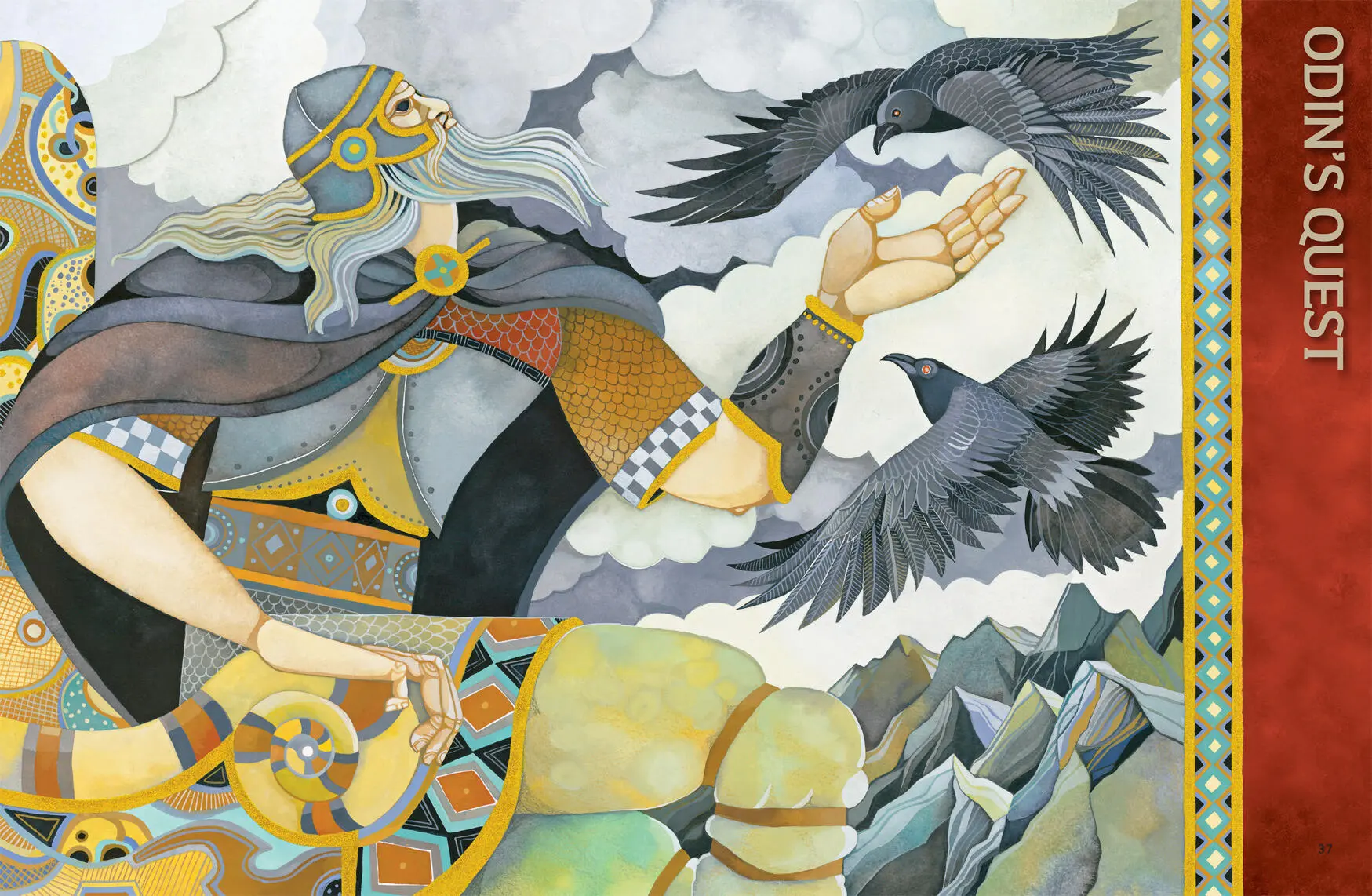
From his throne, Odin could view all nine worlds. Still, he sent out his two ravens to patrol for him and come back with details about happenings in those corners of the cosmos that his eye couldn’t reach.
ODIN’S QUEST

Odin was viewed as harsh and severe. And the one he was most severe with was himself.
When Odin sat on his high seat, Hlidskjalf, he could look out over the cosmos and see a great deal. But not everything. Hmmm. What was going on behind that ridge over there in the land of the dark elves? Who was whispering what under that root of Yggdrasil in Hel? His throat was parched with the yearning for knowledge. So he relied on the two ravens that perched on his shoulders: Huginn (Thought) and Muninn (Memory). They flew off in the morning to investigate the nine worlds with their sharp eyes. At night they returned to Odin and told him all that they had witnessed.
Still, it wasn’t enough. Odin’s mind was greedy; knowledge tasted good, but wisdom, ah, that would taste far better.

Odin and the other gods living in Asgard rode their horses every day over the burning bridge, Bifrost. On the other side was the grand ash tree Yggdrasil and the sacred well of destiny.
By this time there were ten major gods in the cosmos beyond Odin (and before too long, there would be two more). Eight of them were Aesir: Odin’s sons Thor, Balder, Tyr, Heimdall, Hod, and Vidar, plus his grandsons Forseti (son of Balder) and Ull (stepson of Thor). The other two major gods lived among the Aesir, but they had come originally from the Vanir: Njord and Frey. Each day Odin and these ten gods rode their horses over Bifrost, the flaming bridge, to that root of the spreading ash tree Yggdrasil that extended to heaven. Beneath that root was the sacred well Urdarbrunn, where the spring of destiny bubbled up. The gods held their assemblies right there. They made decisions that upheld righteousness and justice, and that protected humans against giants and dwarfs and dark elves. As they sat there, Odin watched two swans swimming with a sense of peace he’d never experienced, and he watched the three lovely Norns sprinkle the sacred tree from the spring of destiny and coat its wounds with a clay salve from the well Urdarbrunn. In this watery ritual he recognized something mystical, beyond reason, something that renewed the everlasting tree’s strength, something that gave those swans equanimity. Water did it—water had that unnamed something that could elevate one to an ever greater strength.
That’s when Odin took a closer look at the giant Mimir. Mimir was but a head at this point, severed from his body by the Vanir. But he was still the wisest one in all Asgard. Under another root of Yggdrasil, the one that stretched into the frost giants’ world, Jotunheim, was a well that Mimir guarded, and so it was called Mimisbrunn. Mimir drank from this well each day. Aha! The well was the source of Mimir’s wisdom! Odin had to have at that well.
And so Odin made a deal with Mimir: an eye for a single draught of that well water. Such a high price, this extreme self-mutilation. But what good was an eye that couldn’t fathom what it saw? Odin willingly scooped it from his own skull and hid it. He fashioned a drinking horn from dragon skin, dipped it into the well, and opened his mouth wide. The cool water sloshed down his throat and radiated throughout his essence. Yes, Odin knew more now, much more; he understood, he was wise. But, alas, he now knew that the highest wisdom of all—that of clairvoyance—was yet to be attained.
And where else to attain it than from the sacred tree Yggdrasil itself? Odin pierced himself with his spear Gungnir, perhaps so that he could come close to understanding the pain the tree experienced from its daily wounds. Then he hanged himself from a high bough. For nine long days and nine long nights, he swung there. He allowed no one to ease his suffering—not a drop of water passed his lips. In this delirious state, near death, he saw below him runes. He knew runes; some were carved on the tip of Gungnir—mysterious letters. But now those letters formed in the tree roots and they yielded their meanings to him and taught him nine precious songs and magic charms and the art of poetry. He looked out at the nine worlds in a new way. He shuddered at the knowledge he now embodied—at the miseries that lay ahead, at the deeds that lay behind, at all the difficulties of getting from day to day in a decent way.
Читать дальшеИнтервал:
Закладка:
Похожие книги на «Treasury of Norse Mythology: Stories of Intrigue, Trickery, Love, and Revenge»
Представляем Вашему вниманию похожие книги на «Treasury of Norse Mythology: Stories of Intrigue, Trickery, Love, and Revenge» списком для выбора. Мы отобрали схожую по названию и смыслу литературу в надежде предоставить читателям больше вариантов отыскать новые, интересные, ещё непрочитанные произведения.
Обсуждение, отзывы о книге «Treasury of Norse Mythology: Stories of Intrigue, Trickery, Love, and Revenge» и просто собственные мнения читателей. Оставьте ваши комментарии, напишите, что Вы думаете о произведении, его смысле или главных героях. Укажите что конкретно понравилось, а что нет, и почему Вы так считаете.
